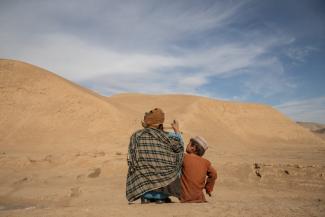Climate Foreign Policy
The climate crisis is exacerbating hardship in conflict areas

The German public associates Afghanistan with instability and war. On my trip there in late 2023, however, I witnessed how climate change is exacerbating an already very difficult situation. “Many people moved away this year because of the drought,” Abdul Haq, a 30-year-old shepherd in the province of Baghdis, told me. Every day he searches for fodder and water for his sheep. He supports himself, his wife, his six children and his parents from the sale of lambs.
“Before the drought, we cultivated grain and wheat,” he says. That source of income is gone.
The climate crisis is worsening poverty and conflict in several countries such as South Sudan, Somalia and Syria. Emergency aid helps in the short term, but people need long-term prospects too. For that reason, peacekeeping measures can no longer be accompanied merely by humanitarian aid and sustainable development projects. Because of global warming, adaptation and stronger resilience must figure in all projects.
A new strategy from Germany’s Federal Government
At the end of 2023, Germany’s Federal Government published its strategy on climate foreign policy. It rightly identifies the climate crisis as “one of the greatest security risks of the 21st century”. Unfortunately, the strategy does not offer specific guidance on how to support affected people in crisis areas.
According to the UN Development Programme (UNDP), conflict-affected countries only got a third of what other developing countries received in terms of average per-capita climate finance in 2020. The more fragile a state is, the less climate funding flows into its programmes. Moreover, international climate finance primarily focusses on reducing emissions, so 90 % goes to middle-income countries. Low-income countries emit few greenhouse gases but suffer severely from climate impacts.
The new Loss and Damage Fund that was agreed to at the COP28 climate conference in Dubai at the end of 2023 is important. It is intended to compensate low-income countries for climate-related damage that can no longer be offset. Germany has pledged $ 100 million. It should ensure that a fair share of these resources reach people in crisis areas and encourage other countries to contribute to the fund as well. This is a start, but international efforts cannot cease here. Other initiatives such as the Women and Climate Security Initiative of the UN Women’s Peace and Humanitarian Fund, which finances local women’s organisations in countries threatened by climate change, also deserve further financial support.
In addition, risk analysis must improve. The focus should not only be on economic impacts of climate shocks. Political and social consequences play a role as well. Analysts should investigate, for example, how existing conflict dynamics are changing, and which groups are particularly at risk. Without such knowledge, funding and aid programmes cannot be directed where they are most urgently needed. Instead, they end up where measures are easiest to implement.
Strengthening local resilience
One thing is clear: the climate crisis and its impacts will require a great deal of resilience and adaptability. The resilience of communities in particularly affected countries must be strengthened. Many organisations are taking innovative approaches, yet still shy away from conflict regions and fragile states. But these are the contexts in which long-term change is especially necessary. It can only be achieved by working directly with affected communities.
Acting with foresight can help families continue to farm and thereby secure their food base. In Syria, the International Rescue Committee is working with farmers to test which seeds will produce reliable yields even in extreme droughts. In Nigeria, we have supported the creation of a decentralised digital early warning system that predicts flooding. It relies both on local experts and satellite data.
Germany’s Federal Government can take a leading role with its new climate foreign policy strategy. Ultimately, success will be measured by whether the resilience of threatened communities is strengthened.
Corina Pfitzner is the managing director of the International Rescue Committee (IRC) in Germany.
executiveoffice.germany@rescue.org













